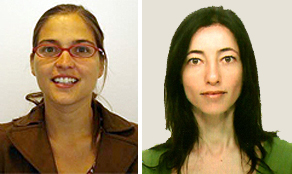IN DEPTH
Cécile Barbeito and Míriam Acebillo are researchers and educators for peace

Cécile Barbeito and Míriam Acebillo
Based on a proposal at the 1st Catalan Conference on the Movement for Peace held in Barcelona in November 2009, the International Catalan Institute for Peace (ICIP) has supported research into the values promoted by Catalan textbooks, beginning with social science textbooks in the fourth year of secondary education.
The aim of the research is to contribute to the general objective of facilitating the addition of criteria of education for peace into textbooks and was carried out by a team composed of history teachers and educators for peace. A dialectical process was also included through fourth-year secondary education teachers, authors and publishers of these textbooks, which resulted in the report Anàlisi dels llibres de text de ciències socials des d'una perspectiva de pau (Quart d'ESO, 2008-2011) ) (Analysis of social science textbooks from a perspective of peace – fourth-year secondary education, 2008-2011).
As the Catalan curriculum states, the social sciences "should facilitate the development of the awareness of students as citizens", which means, as the report states, educating them in the values and attitudes of peace, solidarity, respect for diversity and for other people. In accordance with these values, and in line with the United Nations Declaration and Programme of Action on a Culture of Peace, the research focused on six subject areas: 1) peace and conflict, 2) poverty and social justice, 3) gender, 4) diversity, 5) the environment and 6) democracy and human rights. The methodologies proposed by the textbooks were also analysed.
The analysis made it possible to identify that although some subject areas were well represented, as in the case of social conflict and poverty (the view of the poorest classes and their mobilisation to achieve changes to their situation is represented) and in democracy and human rights (different political systems and alternative ideological currents are described), other subjects are not included to the same degree, or are omitted.
In the perspective of gender and diversity, we can see efforts have been made to deal with the subjects in a specific way (as in the case of women) and from a perspective of respect for differences, but there is a need to apply these perspectives throughout the textbooks (for example, women are invisible at too many points in history, or a Eurocentric perspective is used too often).
The report considers that the subject areas connected to understanding, on one hand peace, violence and conflict and on the other hand the environment, are the least represented in the textbooks. There is a lack or representation of approaches rooted in education for peace regarding social sciences (for example, in the textbooks analysed there are many more descriptions of violence and of wars, the causes of which are not always explained, let alone the consequences of wars on people). Discussion about the relationship between human activity and the environment is also practically non-existent. Regarding the methodology, taking into account that the teaching guides that accompany the textbooks were not analysed, it must be said that the proposed activities are mainly concerned with individual reading comprehension.
These observations have made it possible to make around 30 recommendations. The general recommendations include more study about the challenges represented by the addition of applied competences to textbooks, using documents to transmit a more critical view of history and critically reviewing the concepts and descriptions traditionally used in historiography. As well as the general recommendations, the report makes 25 specific recommendations for subject areas and methodology, such as discussing, as well as the political effects, the consequences for people of wars, economic models, political systems etc.
To define this report in terms of the degree to which the fourth-year secondary education textbooks promote the values, abilities and attitudes of education for peace, this issue of Por la Paz wishes to use and place its analysis and conclusions into broader debates about historiography and education.
The central section includes an article by Jaume Botey, emeritus professor in the Department of Modern and Contemporary History at the Autonomous University of Barcelona, which presents a critical overview of the historiographical currents that were identified in the textbooks. Next, Gemma Tribó, PhD in Contemporary History at Barcelona University discusses what type of history teaching contributes to the values of education for peace.
In a more specific plan, Joan Camós and Albert Marzà, both social science teachers in the fourth year of secondary education, move the debate to the classroom and explain the methodologies that could be used to transmit values. Also, the team from Ramon Llull University led by Maria Carme Boqué presents the latest research being carried out in this field.
The interview with Steven Stegers, the coordinator of EUROCLIO, the European Association of History Educators allows us to find out about the European initiative Historiana, and the conclusions that have been reached about how to teach history in accordance with education for peace.
Finally, the section To Find Out More provides resources for more information about all of these subjects.